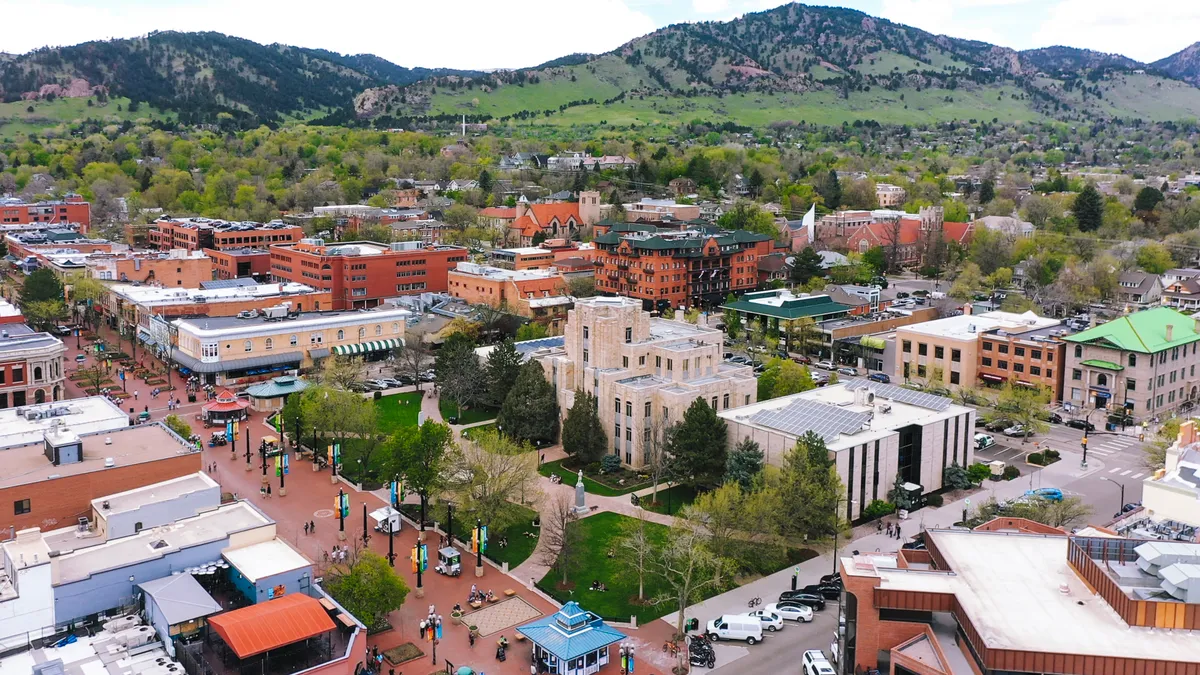Dive Brief:
- Despite a recent pilot program in Boulder, Colorado dedicating a police unit to clear out homeless encampments in public spaces near its downtown, the city has experienced an increasing number of encampment reports and a higher volume of calls to police in those areas, a new report from the city stated.
- Boulder launched a 2021 pilot program that established a city cleanup team and increased police presence in public spaces to “enhance coexistence between the unhoused and the housed communities that use these spaces and to ensure spaces are safe and welcoming for all.”
- A group of homeless service providers with the American Civil Liberties Union Foundation of Colorado has filed a lawsuit against the city and its police department over the anti-camping policies, claiming unhoused individuals are left with no other shelter options and are told to leave Boulder.
Dive Insight:
As the cost of buying and renting a home has continued to rise, encampments, in which unhoused individuals live in tents, have increased in cities throughout the U.S. In response, a number of cities have issued regulations making it illegal to live in tents along sidewalks or in public spaces.
In 2018, the 9th U.S. Circuit Court of Appeals banned Western U.S. cities within its jurisdiction from enacting anti-camping laws if the city does not have enough shelter beds to accommodate the number of people living in their community who are unhoused.
Boulder — located in the 10th U.S. Circuit — has had a longstanding policy that prohibits anyone from sleeping outside in public spaces while using covering, including a blanket, at night and the early morning hours, the ACLU of Colorado lawsuit stated. Last year, the city passed another ordinance that made it a crime to erect or use a tent for shelter or storage on public property. Violating either could subject a person to more than $2,000 in fines and/or 90 days in jail, the lawsuit stated.
The lawsuit, filed last month, takes aim at those two ordinances. The city said in a statement it had just received the lawsuit and will comment in court filings at the appropriate time.
Last year, the city separately spent $2.7 million on an 18-month initiative to enforce its camping ban, according to the Daily Camera. Through the initiative, the city created a downtown ambassador program and a new unit within the police department to help clear encampments and “provide a higher level of safety in the downtown area.”
According to the city report for Boulder’s mayor and city council this week, teams have collected 106 tons of debris and addressed 389 camping sites since February 2021. The report also states that the city’s efforts have allowed for an “increasing sense of safety by providing a consistent uniformed and trained presence” and has provided a resource for downtown stakeholders to address low-level public space issues, reducing the demand on Boulder Police staff.
However, the report also found that since the dedicated enforcement program began, there has been an increased number of reports regarding encampments in public spaces, with a higher number of calls to police, and a large number of "safety-related activities," including graffiti, broken glass and debris. Meanwhile, the nonprofit that the city contracted with to engage the city's unsheltered population will not be moving forward beyond the pilot.
The city noted in the report that the increased calls may be correlated with greater communication to the public as to where to make those reports.
Daniel Williams, a Boulder-based civil rights litigation attorney representing the plaintiffs in the lawsuit, said it’s not surprising that the city's increased enforcement has not reduced the number of people living in encampments or crime reports, since people have no safe day or night shelter to go to.
“The city's enforcement actions just force people to move from one campsite to another,” Williams said. “Making matters worse, this stepped-up enforcement makes it harder for unhoused people to transition out of homelessness because it treats them as criminals, which further marginalizes them.”
In a statement, the city said the pilot program was created to ensure public spaces are well managed for everyone that uses them and that “care and concern are provided to the people who live in them.” Due to staffing shortages that other U.S. cities face as well, some aspects of the pilot took longer to establish than others, the city stated, and the goals in the report were aspirational.
“Knowing the heavy lift of this issue and the many factors that impact this work, including the free will of people living in campsites and the high correlation of unsheltered homelessness with substance use and behavioral issues,” the city stated, “it is highly unlikely that results will show dramatic changes in the short run.”
The city also stated that the removal of campsites is done as a “last resort” when occupants resist services and refuse to vacate. The city stated it is committed to “compassion” and issues multiple soft notices with the attempted engagement of resources before a formal notice, and when finally vacated, residents are allowed to take their belongings with them and city crews address the remaining items.
While the exact size of Boulder’s population is unknown, the lawsuit estimated Boulder County’s unhoused population is “likely somewhere between 1,400 to 4,100 people” — roughly 75% of which live in the city.
But the lawsuit claims the city does not ensure there is an adequate amount of available indoor shelter for its unhoused population before enforcing its encampment bans, with program rules, restrictions and structural realities excluding many people from accessing the limited shelter space that is available. During the day, Boulder has no indoor shelter option at all and on a given night “many unhoused residents are left with no way to live in Boulder without engaging in conduct the city makes a crime.”
The lawsuit also claims that officers enforcing the policies tell unhoused residents to “get out of Boulder.”
Many housed people feel that their unhoused neighbors camping in public spaces are disruptive and impacting their quality of life, said Benjamin Henwood, director of the University of Southern California’s Center for Homelessness, Housing and Health Equity Research, in an email. However, he said, the issue becomes a lack of viable alternatives: Are there other places people can go that are safe and preferable to camping outdoors?
Boulder has become increasingly unaffordable with the median price of buying a home surpassing $1 million. Most people are looking for a safe apartment or home, which is difficult to find and takes increased investment in affordable housing both at the national and local levels, said Henwood.
“Anti-camping often just serves as a ‘leaf blowing’ exercise in which people are scattered to other public areas,” he said. Without a place to go, he added, people without shelter have no alternative other than living in the public domain.
Lisa Sweeney-Miran, a plaintiff in the lawsuit and the executive director of Mother House, which provides shelter for women, transgender and gender non-binary individuals and their kids experiencing homelessness in Boulder, said the enforcement efforts have made some people feel “othered” or afraid and less likely to engage with police.
The city stated that members of the Boulder Police Department working at the campsites are part of its Homeless Outreach Team which has a “long history” of getting people stably housed through partnerships with other providers. It added that there is a standard protocol for storing a person’s belongings and that items are not taken away from them.
But speaking with the city’s unhoused community that her shelter serves, Sweeney-Miran said police are taking possessions away from people who are unsheltered and not connecting them to services, helping them to secure housing, connecting them to local agencies, or offering them food and shelter.
“The consequences of this policy are that these folks who are being terrorized by the police are waking up the next day with even less than they had the day before,” she said. “They have to start from scratch with finding blankets, shelter, and whatever else was stolen from them.”













